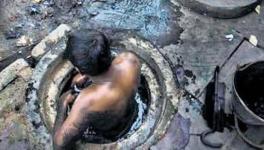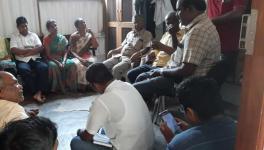Zero Reported Deaths Due to Manual Scavenging: Ramdas Athawale
On December 13, 2022, during the ongoing Winter Session of the Parliament, Lok Sabha Member Kunwar Danish Ali raised the question about the large number of workers that have died while cleaning septic tanks during the current year, along with the details, and the total number of such workers who died during the last five years with state-wise details.
The Minister of State for Social Justice and Empowerment, Shri Ramdas Athawale, responded to the said question by informing the Lok Sabha that “the Government takes a serious cognizance of the deaths occurring due to hazardous cleaning of sewers and septic tanks and non-observance of safety precautions as prescribed under the Prohibition of Employment as Manual Scavengers and their Rehabilitation Rules, 2013.”
The Government also provided state-wise details of persons who are reported to have died due to hazardous cleaning of sewers and septic tanks during the last five and current years, which are as follows:
|
S. No. |
Name of State/ UT |
Total no. of Death |
|||||
|
|
|
2017 |
2018 |
2019 |
2020 |
2021 |
2022 |
|
1. |
Andhra Pradesh |
2 |
9 |
0 |
0 |
0 |
3 |
|
2. |
Bihar |
2 |
0 |
0 |
0 |
0 |
0 |
|
3. |
Chhattisgarh |
0 |
1 |
0 |
0 |
0 |
0 |
|
4. |
Chandigarh |
3 |
0 |
0 |
0 |
0 |
0 |
|
5. |
Delhi |
13 |
11 |
10 |
4 |
4 |
4 |
|
6. |
Dadra Nagar & Haveli |
0 |
0 |
0 |
0 |
3 |
0 |
|
7. |
Gujarat |
7 |
2 |
14 |
0 |
5 |
2 |
|
8. |
Haryana |
11 |
6 |
16 |
0 |
5 |
13 |
|
9. |
Karnataka |
3 |
9 |
7 |
2 |
5 |
0 |
|
10. |
Kerala |
1 |
0 |
0 |
0 |
0 |
0 |
|
11. |
Maharashtra |
6 |
5 |
17 |
4 |
0 |
12 |
|
12. |
Madhya Pradesh |
0 |
0 |
1 |
0 |
3 |
0 |
|
13. |
Odisha |
0 |
0 |
0 |
0 |
2 |
0 |
|
14. |
Punjab |
8 |
2 |
3 |
0 |
2 |
0 |
|
15. |
Rajasthan |
6 |
2 |
5 |
0 |
0 |
0 |
|
16. |
Tamil Nadu |
7 |
9 |
13 |
9 |
8 |
10 |
|
17. |
Telangana |
2 |
3 |
0 |
0 |
4 |
0 |
|
18. |
Uttar Pradesh |
17 |
8 |
28 |
0 |
4 |
4 |
|
19. |
Uttarakhand |
2 |
0 |
1 |
0 |
0 |
0 |
|
20. |
West Bengal |
10 |
0 |
2 |
0 |
4 |
0 |
|
|
Total |
100 |
67 |
117 |
19 |
49 |
48 |
Responding to the inquiry of the steps taken by the Government to stop the death incidents of workers while cleaning of sewage and septic tanks and to save the septic tank cleaners, the Minister replied that “Ministry of Social Justice and Empowerment has also formulated “National Action for Mechanised Sanitation Ecosystem” (NAMASTE) particularly to stop deaths of Sewers and Septic Tank Workers (SSWs). NAMASTE intends formalization of system of cleaning of sewers and septic tanks operations so that only trained workers are engaged in cleaning of sewers and septic tanks and no person loses life due to hazardous cleaning.”
The reply can be read here;
No conviction in deaths
In the last Parliament session, Raja Sabha MP Jaya Bachchan said in the House that in the last two years, as many as 1,470 manual scavengers had died across the country. According to data cited in the Lok Sabha by the Union Minister of Social Justice and Empowerment, Ramdas Athawale, 325 people have died in the last five years in “accidents” while cleaning sewer and septic tanks. Of these, Delhi stood third in the country with 36 deaths after Tamil Nadu (43) and Uttar Pradesh (52).
The government blames the lack of sanitary precautions by the cleaners as the cause of death, absolving employers from responsibility. Activists have decried the government’s apathetic attitude towards the marginalised sections. The government does not identify deaths due to manual scavenging but calls them deaths due to hazardous cleaning of septic tanks and sewers.
As no government or private contractors are held guilty, the relatives of the bereaved are denied justice and financial compensation. Many cases were registered by the Delhi government under the SC/ST Act and Manual Scavenging Prohibition Act of 2013 only after severe reproach from courts. “But conviction rate is negligible. In December, the Centre had said in the Parliament, that cases registered for violation of the law were at different stages but did not come to a logical conclusion,” informed Rakshit Kumar.
It seems the governments are washing off their complicity by passing the buck on to private contractors and their negligence. Safai Karmachari Andolan, an organization working to eradicate manual scavenging, alleges that the government is deliberately under-reporting death numbers to dodge responsibility.
Three years after the Delhi government’s Sani-enterprise initiative
In 2019, AAP government had rolled out an ambitious plan to make manual cleaners sani-entrepreneurs. The intention behind the move was to empower people engaged in manual sewer cleaning by providing them a decent source of income. This is despite manual scavenging being prohibited under the law, and the Delhi government launching a scheme to deploy cleaning machines to weed out the practice.
The Government extended loan to buy truck-fitted cleaning machinery costing 20 lakhs. The machines have been fitted with necessary equipment ensuring hydraulic, jetting, grabbing and roding work. It can ensure cleaning the manholes of 30 feet deep and can clean the sewerage and bring the silt, slug and other waste out to a trolley.
It was decided to provide such cleaning machines to 200 people already engaged in cleaning activities. Delhi Jal Board took the initiative to reduce the death related with manual cleaning of sewers.
But, after three years no considerable decline was recorded in the number of people engaged in hazardous cleaning activities. Procedural hiccups and financial constraints sealed the fate of the project.
People were asked to submit Rs 4 lakhs as upfront money to get loan, a huge sum for people doing daily wage jobs. The apathy by private players to switch to machines also dampened the process of change.
Rehabilitation of Manual Scavengers
On December 13, 2022, during the ongoing Winter Session of the Parliament, Lok Sabha Member Durga Das Uikey further raised the inquiry regarding the details of the amount distributed as compensation to the families of deceased manual scavengers along with the total number of deceased during the last three years and the current year, State-wise.
The Minister of State for Social Justice and Empowerment, Shri Ramdas Athawale, responded to the said question by informing the Lok Sabha that “No death has been reported due to engaging in Manual Scavenging (which is lifting of human excreta from insanitary latrines as defined in Section 2(1) (g) of the MS Act, 2013). However, 233 persons have died due to accidents while undertaking hazardous cleaning of sewer and septic tanks during the last three years and current year.”
He further provided details regarding the total number of deaths reported and the compensation paid. As per the data, 117 people died in the year 2019, out of which 87 were compensated. In the year 2020, 19 deaths took place while 14 were compensated while 47 were compensated out of the 49 who died in the year 2021. For the year 2022, 48 people died while 43 were compensated.
The Government also detailed the funds released under Self-Employment Scheme for Rehabilitation of Manual Scavengers (SRMS) during the last three financial years, which are as:
|
S. No. |
Financial Year |
Funds Released |
|
1. |
2019-20 |
84.80 |
|
2. |
2020-21 |
16.60 |
|
3. |
2021-22 |
39.00 |
|
|
Total |
140.40 |
The reply can be read here;
What Does MS Act, 2013 Say?
The Prohibition of Employment as Manual Scavengers and their Rehabilitation Act, 2013 (also known as the MS Act) deems manual scavengers to be persons engaged or employed by an individual or local authority for "manually cleaning, carrying, disposing of, or otherwise handling, in any manner, human excreta in an insanitary latrine or in open drain" before it fully decomposes.
The Act further states that the person must be engaged or employed on a regular or contract basis, and that persons involved in cleaning excreta with the help of "devices and using protective gear" shall not be deemed to be a 'manual scavenger.'
Is the Centre misrepresenting the death data in the Parliament?
Even in the last sessions of the Parliament, Social Justice Minister Ramdas Athawale appeared to have made erroneous statements with respect to manual scavenging and the data thereof. The answers given then were similar to the answers given during this Winter session, wherein Athawale had responded saying that there are no reports of people currently engaged in manual scavenging in the country.
But, the media reports and the ground reality is different. In 2019, social justice and empowerment secretary Nilam Sawhney, while elaborating on the draft National Action plan to eliminate manual scavenging by 2022, had admitted that 776 deaths took place while cleaning of sewers and septic tanks, reported the Times of India.
A Hindustan Times report said that, in a PIL filed before the Karnataka HC, it was revealed that 43 people have died in 21 cases of manual scavenging in the state since 2015. The petitioner also stated that such deaths are usually given the name of death by accident and thus put such worker’s lives at danger.
According to the central government data, Gujarat recorded 28 deaths of workers in sewers out of which only 23 families of the deceased had received the compensation of worth Rs. 10 lakh as mandated by the Supreme Court. However, it was revealed that the state government failed to compensate for any of the 12 deaths in the last 2 years.
Haryana recorded 33 deaths, fully paid 23 families and partially paid six families. Rajasthan and West Bengal with 13 such deaths each fully compensated 11 and eight families respectively and partially paid one family each. Meanwhile, Goa, Tripura and Uttarakhand claimed to have zero deaths due to manual scavenging.
Similarly, Delhi with 42 recorded deaths fully compensated only 37 families. The status of compensation for the rest of the families is unknown. A similar story persists in Maharashtra with 30 deaths but only 11 fully compensated. In the case of these two regions, the remaining families and dependents were not even provided any fiscal payment at all. Only Punjab accounted for all recorded deaths (16) and compensation by providing the full amount to 10 families and partial payment to six families.
Get the latest reports & analysis with people's perspective on Protests, movements & deep analytical videos, discussions of the current affairs in your Telegram app. Subscribe to NewsClick's Telegram channel & get Real-Time updates on stories, as they get published on our website.


















